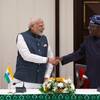The Pacific Northwest region of the United States – home to major Puget Sound container ports in Tacoma and Seattle – is expanding its worldwide exports.
According to the Washington Council on International Trade (WCIT), one-third of the Washington state's economic activity, one-third of its agricultural product and one in three jobs depends on international trade.
And on a per capita basis, Washington is now the most trade-dependent state in the United States. "When you take our total two-way trade volume – more than $110 billion annually – and divide by our population of roughly 6.3 million Washingtonians, you get an annual two-way trade volume of more than $17,000 per person," WCIT President Bill Center said in a recent speech to the National Lieutenant Governors' Association.
States with a larger aggregate total such as California, Texas and New York, Center noted, have a per-capita volume of approximately $8,000.
In 2006 alone, Washington state exported $53 billion worth of goods to global customers, according to the World Institute for Strategic Economic Research, an international trade statistics database. Pacific Rim trade represented nearly half of our state's total exports at 24.5 percent.
At the Port of Tacoma, the average annual export growth over the past five years is 14 percent.
"These growing markets, especially in Asia and India, have more expendable income, are highly educated, and many have traveled or been educated in the United States," said Tong Zhu, the Port of Tacoma's Director of Commercial Strategy. "They want U.S. products."
But Zhu says success in the international marketplace is not as simple as offering up more of what's popular in the United States and expecting brisk sales. "It's very important for us to keep innovation going and localize our products in terms of features, packaging to fit the needs of customers, and the suitability to the specific market," she explained. "For example, among the Japanese, Chinese and the Korean markets, there are great differences. So manufacturers can't consider the whole Asian market as one entity."
Featured videos

Inmarsat Enhances Service to Drive Digitalization

Inside the Electrified Truckable Tug

Tracking Foreign Vessels Working in the U.S. Jones Act Market
Subscribe for
Maritime Reporter E-News
Maritime Reporter E-News is the maritime industry's largest circulation and most authoritative ENews Service, delivered to your Email five times per week









